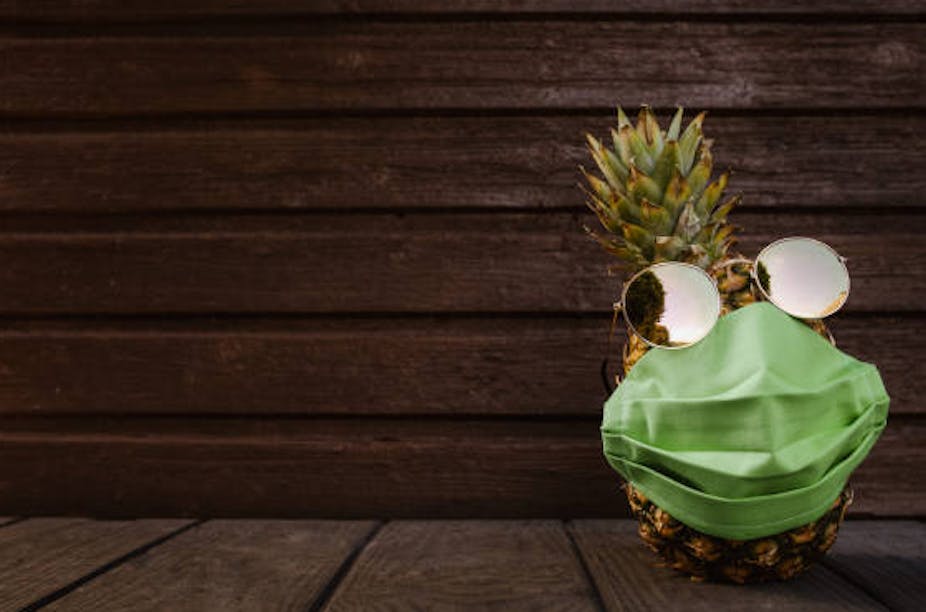The COVID-19 pandemic has led to an increased demand for single-use masks, putting pressure on global plastic waste problems.
A single face mask can release as many as 173,000 microfibres per day into the seas. According to a 2020 report by an environmental group OceansAsia, about 1.56 billion face masks entered oceans globally in 2020.
Face masks are made from combination of several types of plastic. There are several layers of plastic in one mask, primarily polypropylene, which are not easily decomposed and will remain in the environment for decades. It could take centuries for them to turn into smaller and smaller microplastics and nanoplastics.
As the mask wastes may contribute to plastic pollution, it may also accumulate and release harmful chemical and biological substances such as bisphenol A (BPA), which may have a carcinogenic effect, as well as heavy metals and disease-causing microbes. This is becoming a significant problem, particularly in countries with poor waste management. The race to find a sustainable solution for public health safety measures is urgent to reduce the global plastic problem.

As biotechnology researchers, we propose biodegradable disposal masks made from pineapple leaves to tackle pandemic-associated waste. Pineapple leaves contain high levels of cellulose, and thus can be a good alternative to plastic fibres.
The advantages of pineapple fibre
Our biodegradable, disposable masks are made from fibres from pineapple leaves. This pineapple-leaf fibre is made of roughly 70% cellulose, making them easy to decompose. As the fibre is immersed in the soil, it only takes three days for microorganisms such as fungi or bacteria to begin the degradation process.
Pineapple leaves, which are typically discarded as agricultural waste, have been used to make products such as rope, twine, composites and clothes. It has a more delicate texture than many other vegetable fibres such as hemp, jute, flax and abaca. It has white and lustrous-like silk, about 60cm length on average, and can easily dyed in a range of different colours.
Pineapple fibre is roughly ten times coarse than cotton. It contains cellulose, hemicelluloses and lignin as its primary components, which make the fibre light, easy to care for and attractive, with a linen-like appearance.
The fibre is also much better than regular cotton as it doesn’t contain as many harmful chemicals left over from the manufacturing process. The fibre also can naturally degrade without releasing harmful toxins.
In contrast, cotton is conventionally grown with highly toxic pesticides and fertilisers, and treated with harsh chemicals during the manufacturing process and some of these chemicals are still intact and cannot be washed out.
Pineapple-fibre masks are even more effective than cloth masks to prevent infections.
However, pineapple fibre is not as strong as the plastic fibre, particularly in wet and humid conditions. This may be due to the penetration of water molecules into the molecular chain of cellulose fibre in the plant, which reduces its density and strength.
More research is needed to address this challenge.
Challenges and opportunities
As the world’s fourth-largest producer of pineapple, and one of its major consumers, Indonesia can grab the opportunity to lead biodegradable masks production, as well as tackling COVID-related waste.
However, the development of pineapple fibre masks in Indonesia still depends on public awareness and effective communication. To accelereate eco-friendly mask production, reusable organic mask producers, marketers, and policymakers must consider improving consumer behaviours by promoting healthy and eco-friendly habits.
Scientific analyses must also be encouraged by the government, science institutions, companies doing research and development, and also non-profit organisations in order to raise environmental awareness and encourage beneficial changes in lifestyle, consumption habits and behaviours.
To do that, we need to set an an integrated system with an strict requirements to improve mask producer responsibilities and incentives fees for environmentally friendly material.
In the end, instead of using plastic surgical masks, are we going to use this pineapple fibre mask? The decision is yours.

